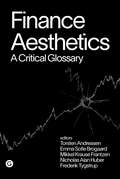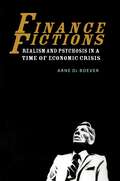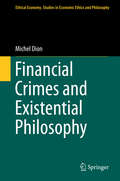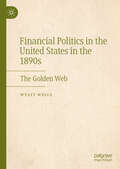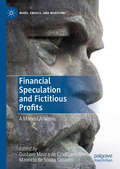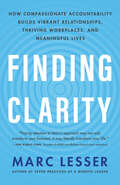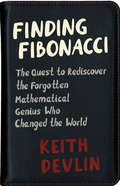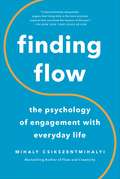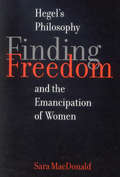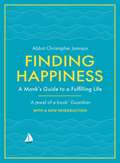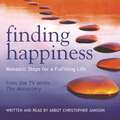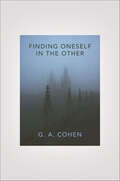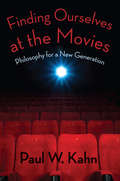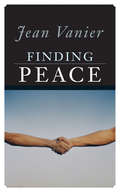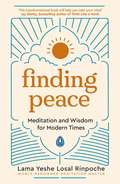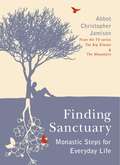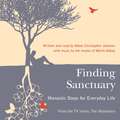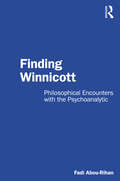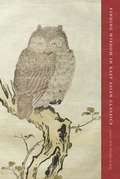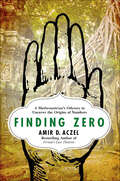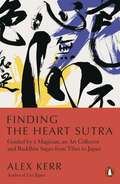- Table View
- List View
Finance Aesthetics: A Critical Glossary (Goldsmiths Press / PERC Papers)
by Torsten Andreasen, Emma Sofie Brogaard, Mikkel Krause Frantzen, Nicholas Alan Huber, and Frederik TygstrupA unique, critical, and creative encyclopedia from scholars, artists, and writers on the world and words of finance capital.What does finance capital look like? How do the push and pull of debt and credit shape our feelings and relations? Across fifty-five unforgettable entries, Finance Aesthetics: A Critical Glossary offers an unorthodox appraisal of our bizarre, distorted contemporary condition.
Finance Fictions: Realism and Psychosis in a Time of Economic Crisis
by Arne De BoeverFinance Fictions takes the measure of what it means to live in a world ruled by high finance by examining the tension between psychosis and realism that plays out in the contemporary finance novel. When the things traded at the center of the economy cease to be things at all, but highly abstracted speculations, how do we come to see the real? What sorts of narrative can accurately approach the actual workings of a neoliberal economy marked by accelerating cycles of market crashes, economic and political crisis, and austerity?Revisiting such twentieth-century classics of the genre as Tom Wolfe's Bonfire of the Vanities and Bret Easton Ellis’s American Psycho, De Boever argues that the twenty-first century is witnessing the birth of a new kind of realistic novel that can make sense of complex financial instruments like collateralized debt obligations, credit default swaps, and digital algorithms operating at speeds faster than what human beings or computers can record. If in 1989 Wolfe could still urge novelists to work harder to “tame the billion-footed beast of reality,” today’s economic reality confronts us with a difference that is qualitative rather than quantitative: a new financial ontology requiring new modes of thinking and writing.Mobilizing the philosophical thought of Quentin Meillassoux in the close reading of finance novels by Robert Harris, Michel Houellebecq, Ben Lerner and less well-known works of conceptual writing such as Mathew Timmons’ Credit, Finance Fictions argues that realism is in for a speculative update if it wants to take on the contemporary economy—an “if” whose implications turn out to be deeply political. Part literary study and part philosophical inquiry, Finance Fictions seeks to contribute to a new mindset for creative and critical work on finance in the twenty-first century.
Financial Crimes and Existential Philosophy
by Michel DionThe aim of this book is to deepen our understanding of financial crimes as phenomena. It uses concepts of existential philosophies that are relevant to dissecting the phenomenon of financial crimes. With the help of these concepts, the book makes clear what the impact of financial crimes is on the way a human being defines himself or the way he focuses on a given notion of humankind. The book unveils how the growth of financial crimes has contributed to the increase of the anthropological gap, and how the phenomenon of financial crimes now distorts the way we understand humankind. Using the existential philosophies of Kierkegaard, Nietzsche, Jaspers, Buber, Heidegger, and Marcel, the book sheds light on how these philosophies can help to better perceive and describe financial crimes. Next it looks at prevention strategies from an organizational perspective, using concepts of Sartre, Gadamer and Tillich. The book provides readers with existential principles that will help them be more efficient when they have to design and implement prevention strategies against corporate crime.
Financial Politics in the United States in the 1890s: The Golden Web
by Wyatt WellsIn the 1890s, the choice between the gold standard and the free coinage of silver upended American politics. The gold standard linked the United States to the larger international financial system, in which gold was the common denominator. The free coinage of silver would effectively sever these ties by devaluing the dollar. The gold standard allowed the U.S. to secure vast amounts of foreign capital on good terms to build railroads and develop industry, but at the cost of deflation. The free coinage of silver would raise prices, particularly for cotton and wheat, whose cultivators carried heavy debts and were hard-pressed. The struggle would define the United States. Would it continue to develop industrially, or would it return to its agricultural roots? The combatants—among them Grover Cleveland, William Jennings Bryan, J.P. Morgan, and William McKinley—understood what was at stake. This book deals both with well-known aspects of the contest, such as the 1896 Presidential election between McKinley and Bryan, and lesser-known ones, such as how the currency issues interacted with racial politics and international negotiations over the role of silver in the world&’s monetary system. The result is the most comprehensive account of financial politics in the United States in the 1890s yet published.
Financial Speculation and Fictitious Profits: A Marxist Analysis (Marx, Engels, and Marxisms)
by Gustavo Moura de Cavalcanti Mello Mauricio de Souza SabadiniThis book provides an original account of financialisation and outlines the creation of fictitious profits as a basis to describe the present phase of capitalist accumulation in the neoliberal era. Making innovative theoretical elaborations on Marx’s notion of fictitious capital, Financial Speculation and Fictitious Profits offers a dialectic analysis of the increasing financialization during this crisis-ridden period based on the original concepts of fictitious profit and fictitious wealth. Combining the most important research from over twenty years of scholarly inquiry with groundbreaking new studies, Financial Speculation and Fictitious Profits is more than a collection of texts by political economists on a contemporary topic; it is a synthesis of an intense process of academic production that began with work of Karl Marx and has resulted in the formulation of a differentiated interpretative perspective on the contemporary evolution of capitalist crisis.
Finding Clarity: How Compassionate Accountability Builds Vibrant Relationships, Thriving Workplaces, and Meaningful Lives
by Marc LesserA SURPRISING PATH TO BREAKTHROUGH COMMUNICATION AND PROFESSIONAL SUCCESS For Marc Lesser the key to healthy relationships and effective workplaces is compassionate accountability — a practical and trainable way to clarify and achieve shared visions of success. Numerous examples include: • facing rather than avoiding conflict for the long-term benefit of all. • working with and through difficult emotions with clarity, care, and connection. • understanding the stories we live by and evaluating whether they’re serving us well. • learning to listen and lead in ways that align with our mission and values. Marc works from the premise that problems are inevitable and that the success of an enterprise or relationship relies on how they are resolved. This applies to any joint effort — in a workplace, a family, a civic organization, a community, a country, or the world at large.
Finding Fibonacci: The Quest to Rediscover the Forgotten Mathematical Genius Who Changed the World
by Keith DevlinIn 2000, Keith Devlin set out to research the life and legacy of the medieval mathematician Leonardo of Pisa, popularly known as Fibonacci, whose book Liber abbaci has quite literally affected the lives of everyone alive today. Although he is most famous for the Fibonacci numbers—which, it so happens, he didn't invent—Fibonacci's greatest contribution was as an expositor of mathematical ideas at a level ordinary people could understand. In 1202, Liber abbaci—the "Book of Calculation"—introduced modern arithmetic to the Western world. Yet Fibonacci was long forgotten after his death, and it was not until the 1960s that his true achievements were finally recognized.Finding Fibonacci is Devlin's compelling firsthand account of his ten-year quest to tell Fibonacci's story. Devlin, a math expositor himself, kept a diary of the undertaking, which he draws on here to describe the project's highs and lows, its false starts and disappointments, the tragedies and unexpected turns, some hilarious episodes, and the occasional lucky breaks. You will also meet the unique individuals Devlin encountered along the way, people who, each for their own reasons, became fascinated by Fibonacci, from the Yale professor who traced modern finance back to Fibonacci to the Italian historian who made the crucial archival discovery that brought together all the threads of Fibonacci's astonishing story.Fibonacci helped to revive the West as the cradle of science, technology, and commerce, yet he vanished from the pages of history. This is Devlin's search to find him.
Finding Flow: The Psychology Of Engagement With Everyday Life
by Mihaly CsikszentmihalyiFrom one of the pioneers of the scientific study of happiness, an indispensable guide to living your best life.What makes a good life? Is it money? An important job? Leisure time? Mihaly Csikszentmihalyi believes our obsessive focus on such measures has led us astray. Work fills our days with anxiety and pressure, so that during our free time, we tend to live in boredom, watching TV or absorbed by our phones.What are we missing? To answer this question, Csikszentmihalyi studied thousands of people, and he found the key. People are happiest when they challenge themselves with tasks that demand a high degree of skill and commitment, and which are undertaken for their own sake. Instead of watching television, play the piano. Take a routine chore and figure out how to do it better, faster, more efficiently. In short, learn the hidden power of complete engagement, a psychological state the author calls flow. Though they appear simple, the lessons in Finding Flow are life-changing.
Finding Freedom
by Sara MacdonaldCombining a detailed study of Hegel's political philosophy with close readings of two important literary works that help clarify his thought, MacDonald traces the historical development of an enduring link between personal lives and stable political communities. While Sophocles' Antigone highlights the tension in states that deny the interests of their citizens, MacDonald shows that Shakespeare's A Midsummer Night's Dream offers an alternative image, one that sees freedom for all as essential to an ethical family and state and is consistent with Hegel's thought in both the Phenomenology of Spirit and The Philosophy of Right.
Finding Freedom: Hegel's Philosophy and the Emancipation of Women (McGill-Queen's Studies in the History of Ideas #45)
by Sara MacDonaldCombining a detailed study of Hegel's political philosophy with close readings of two important literary works that help clarify his thought, MacDonald traces the historical development of an enduring link between personal lives and stable political communities. While Sophocles' Antigone highlights the tension in states that deny the interests of their citizens, MacDonald shows that Shakespeare's A Midsummer Night's Dream offers an alternative image, one that sees freedom for all as essential to an ethical family and state and is consistent with Hegel's thought in both the Phenomenology of Spirit and The Philosophy of Right.
Finding Happiness: A monk's guide to a fulfilling life
by Father Christopher Jamison OSBAbbot Christopher Jamison from hit TV series THE MONASTERY, turns his attention to the eternal questions of how to be happy, and why we believe it is so important.Why is 'being happy' such an imperative nowadays? What meaning do people give happiness?In this book Abbot Christopher turns to monastic wisdom to offer answers, and to explain that in essence, happiness is a gift, not an achievement, the fruit of giving and receiving blessings.Following the same accessible and engaging format of FINDING SANCTUARY, Abbot Christopher takes different aspects of happiness, examines them, tells us what monastic wisdom has to say about them, and offers us steps towards our own journey to finding happiness.
Finding Happiness: A monk's guide to a fulfilling life
by Father Christopher Jamison OSBWhy is 'being happy' such an imperative nowadays? What meaning do people give happiness?In this book Abbot Christopher turns to monastic wisdom to offer answers, and to explain that in essence, happiness is a gift, not an achievement, the fruit of giving and receiving blessings.Following the same accessible and engaging format of FINDING SANCTUARY, Abbot Christopher takes different aspects of happiness, examines them, tells us what monastic wisdom has to say about them, and offers us steps towards our own journey to finding happiness.Read by Christopher Jamison(p) 2008 Orion Publishing Group
Finding Happiness: A monks guide to a fulfilling life
by Christopher JamisonAbbot Christopher Jamison from hit TV series THE MONASTERY, turns his attention to the eternal questions of how to be happy, and why we believe it is so important.Why is 'being happy' such an imperative nowadays? What meaning do people give happiness?In this book Abbot Christopher turns to monastic wisdom to offer answers, and to explain that in essence, happiness is a gift, not an achievement, the fruit of giving and receiving blessings.Following the same accessible and engaging format of FINDING SANCTUARY, Abbot Christopher takes different aspects of happiness, examines them, tells us what monastic wisdom has to say about them, and offers us steps towards our own journey to finding happiness.
Finding Oneself in the Other
by G. A. CohenThis is the second of three volumes of posthumously collected writings of G. A. Cohen, who was one of the leading, and most progressive, figures in contemporary political philosophy. This volume brings together some of Cohen's most personal philosophical and nonphilosophical essays, many of them previously unpublished. Rich in first-person narration, insight, and humor, these pieces vividly demonstrate why Thomas Nagel described Cohen as a "wonderful raconteur.? The nonphilosophical highlight of the book is Cohen's remarkable account of his first trip to India, which includes unforgettable vignettes of encounters with strangers and reflections on poverty and begging. Other biographical pieces include his valedictory lecture at Oxford, in which he describes his philosophical development and offers his impressions of other philosophers, and "Isaiah's Marx, and Mine," a tribute to his mentor Isaiah Berlin. Other essays address such topics as the truth in "small-c conservatism," who can and can't condemn terrorists, and the essence of bullshit. A recurring theme is finding completion in relation to the world of other human beings. Engaging, perceptive, and empathetic, these writings reveal a more personal side of one of the most influential philosophers of our time.
Finding Ourselves at the Movies
by Paul W. KahnAcademic philosophy may have lost its audience, but the traditional subjects of philosophy -- love, death, justice, knowledge, and faith -- remain as compelling as ever. To reach a new generation, Paul W. Kahn argues philosophy must be brought to bear on contemporary discourse surrounding these primal concerns, and he shows how this can be achieved through a turn to popular film.In such well-known movies as Forrest Gump (1994), The American President (1995), The Matrix (1999), Memento (2000), The History of Violence (2005), Gran Torino (2008), The Dark Knight (2008), The Road (2009), and Avatar (2009), Kahn explores powerful archetypes and their hold on us, and he treats our present-day anxieties over justice, love, and faith as signs these traditional imaginative structures have failed. His inquiry proceeds in two parts. First, he uses film to explore the nature of action and interpretation, and narrative, not abstraction, emerges as the critical concept for understanding both. Second, he explores the narratives of politics, family, and faith as they appear in popular films. Engaging with genres as diverse as romantic comedies, slasher films, and pornography, Kahn gains access to the social imaginary, through which we create and maintain a meaningful world.
Finding Ourselves at the Movies: Philosophy for a New Generation
by Paul KahnAcademic philosophy may have lost its audience, but the traditional subjects of philosophy—love, death, justice, knowledge, and faith—remain as compelling as ever. To reach a new generation, Paul W. Kahn argues that philosophy must take up these fundamental concerns as we find them in contemporary culture. He demonstrates how this can be achieved through a turn to popular film.Discussing such well-known movies as Forrest Gump (1994), The American President (1995), The Matrix (1999), Memento (2000), The History of Violence (2005), Gran Torino (2008), The Dark Knight (2008), The Road (2009), and Avatar (2009), Kahn explores powerful archetypes and their hold on us. His inquiry proceeds in two parts. First, he uses film to explore the nature of action and interpretation, arguing that narrative is the critical concept for understanding both. Second, he explores the narratives of politics, family, and faith as they appear in popular films. Engaging with genres as diverse as romantic comedy, slasher film, and pornography, Kahn explores the social imaginary through which we create and maintain a meaningful world. He finds in popular films a new setting for a philosophical inquiry into the timeless themes of sacrifice, innocence, rebirth, law, and love.
Finding Pathways
by Nicholas Weller Jeb BarnesSocial scientists have identified a need to move beyond the analysis of correlation among variables to the study of causal mechanisms that link them. Nicholas Weller and Jeb Barnes propose that a solution lies in 'pathway analysis': the use of case studies to explore the causal links between related variables. This book focuses on how the small-N component of multi-method research can meaningfully contribute and add value to the study of causal mechanisms. The authors present both an extended rationale for the unique role that case studies can play in causal mechanism research, and a detailed view of the types of knowledge that case studies should try to generate and how to leverage existing large-N data to guide the case selection process. The authors explain how to use their approach both to select cases and to provide context on previously studied cases.
Finding Peace
by Jean VanierOne of our deepest human desires and needs is to live in peace. We all yearn for peace, but what is it exactly? How do we find it, and how can we bring peace to our lives and our communities? Jean Vanier reflects on recent world events, identifying the sources of conflict and fear within and among individuals, communities, and nations that thwart us in our quest for peace. Peace is not just the work of governments or armies or diplomats, he argues, but the task of each one of us. We can all become makers of peace. We can do our part. And though it's easy to be a love of peace and much more difficult to be a worker for peace, Vanier shows us that ordinary people, unknown and unrecognized, are transforming our world little by little, finding peace in our neighbourhoods and lighting the way to change.
Finding Peace: Meditation and Wisdom for Modern Times
by Lama Yeshe Losal Rinpoche'This transformational book will help you calm your mind, remove negativity and find inner peace.' Jay Shetty, author of Think Like a Monk'The perfect manual for the mind, bringing deep insight to today's world and offering practical tools for transformation' Gelong Thubten, author of A Monk's Guide to Happiness _______________________________________________________________________________In this hectic, modern world, the practice of meditation is the greatest way to calm your mind and find peace.A collection of teachings from one of the world's wisest minds, the lessons in this book have transformed the lives of people across the world and have never been more pertinent. In this book world-renowned meditation master, Lama Yeshe,shares how meditation enabled him to overcome the strains and pressures of modern life and find peace - and reveals how we can all do the same.He teaches us that our minds are infinite like the sky, which can easily become clouded with stress and emotions, but with meditation we are able to see beyond the clouds and free our minds of obstacles. With practical steps on breathing, posture, forgiveness, relationships and establishing a meditation routine, this is the definitive guide for beginners and experienced meditators alike to learn from the wisdom of a globally revered meditation master.
Finding Sanctuary: Monastic steps for Everyday Life
by Christopher JamisonAbbot Christopher Jamison, from BBC2's THE MONASTERY and new show THE SILENCE, suggests ways in which the teachings of St Benedict can be helpful in everyday life.Have you ever wondered why everybody these days seems so busy? In FINDING SANCTUARY, Father Christopher Jamison offers practical wisdom from the monastic tradition on how to build sanctuary into your life.No matter how hard you work, being too busy is not inevitable. Silence and contemplation are not just for monks and nuns, they are natural parts of life. Yet to keep hold of this truth in the rush of modern living you need the support of other people and sensible advice from wise guides. By learning to listen in new ways, people's lives can change and the abbot offers some monastic steps that help this transition to a more spiritual life.In the face of many easy assumptions about the irrelevance of religion today, Father Christopher makes religion accessible for those in search of life's meaning and offers a vision of the world's religions working together as a unique source of hope for the 21st century.
Finding Sanctuary: Monastic steps for Everyday Life
by Father Christopher Jamison OSBHave you ever wondered why everybody these days seems so busy? In FINDING SANCTUARY, Father Christopher Jamison, the Abbot from BBC TV's THE MONASTERY and THE SILENCE, offers practical wisdom from the monastic tradition on how to build sanctuary into your life.No matter how hard you work, being too busy is not inevitable. Silence and contemplation are not just for monks and nuns, they are natural parts of life. Yet to keep hold of this truth in the rush of modern living you need the support of other people and sensible advice from wise guides. By learning to listen in new ways, people's lives can change and the abbot offers some monastic steps that help this transition to a more spiritual life.In the face of many easy assumptions about the irrelevance of religion today, Father Christopher makes religion accessible for those in search of life's meaning and offers a vision of the world's religions working together as a unique source of hope for the 21st century.Read by Christopher Jamison(p) 2006 Orion Publishing Group
Finding Winnicott: Philosophical Encounters with the Psychoanalytic
by Fadi Abou-RihanIn Finding Winnicott: Philosophical Encounters with the Psychoanalytic, Fadi Abou-Rihan expands upon Winnicott’s category of the found object and argues that a genuine understanding of the analyst’s own thought requires that it be considered in relation to that of another. The essays in this collection are in dialogue with the work of Freud, Deleuze and Guattari, Laplanche, Bonaventure, Ibn Al-’Arabi, and Huizinga; these encounters showcase some of Winnicott’s yet unexplored contributions to the questions of subjectivity, time, and language. They weave psychoanalytic theory, clinical vignette and key moments from the history of ideas in order to shed light on our findings regarding, and indeed findings of, desire, on some of the playful but no less compelling ways in which the subject lives, suffers, understands, questions and/or normalizes desire. Chapters span a range of topics including rationales, findings and spaces, and highlight the subject as not only that which finds but that which is found. With clinical vignettes throughout, this book is vital reading for practicing analysts, as well as analysts in training and students of both philosophy and psychoanalysis.
Finding Wisdom in East Asian Classics
by Ed. De Bary Wm. TheodoreFinding Wisdom in East Asian Classics is an essential, all-access guide to the core texts of East Asian civilization and culture. Essays address frequently read, foundational texts in Chinese, Japanese, Korean, and Vietnamese, as well as early modern fictional classics and nonfiction works of the seventeenth century. Building strong links between these writings and the critical traditions of Confucianism, Buddhism, and Daoism, this volume shows the vital role of the classics in the shaping of Asian history and in the development of the humanities at large.Wm. Theodore de Bary focuses on texts that have survived for centuries, if not millennia, through avid questioning and contestation. Recognized as perennial reflections on life and society, these works represent diverse historical periods and cultures and include the Analects of Confucius, Mencius, Laozi, Xunxi, the Lotus Sutra, Tang poetry, the Pillow Book, The Tale of Genji, and the writings of Chikamatsu and Kaibara Ekken. Contributors explain the core and most commonly understood aspects of these works and how they operate within their traditions. They trace their reach and reinvention throughout history and their ongoing relevance in modern life. With fresh interpretations of familiar readings, these essays inspire renewed appreciation and examination. In the case of some classics open to multiple interpretations, de Bary chooses two complementary essays from different contributors. Expanding on debates concerning the challenges of teaching classics in the twenty-first century, several pieces speak to the value of Asia in the core curriculum. Indispensable for early scholarship on Asia and the evolution of global civilization, Finding Wisdom in East Asian Classics helps one master the major texts of human thought.
Finding Zero: A Mathematician's Odyssey to Uncover the Origins of Numbers
by Amir D. Aczel“A captivating story, not just an intellectual quest but a personal one . . . gripping [and] filled with the passion and wonder of numbers.” —The New York TimesVirtually everything in our lives is digital, numerical, or quantified. But the story of how and where we got these numerals, which we so depend on, has for thousands of years been shrouded in mystery. Finding Zero is the saga of Amir Aczel’s lifelong obsession: to find the original sources of our numerals, perhaps the greatest abstraction the human mind has ever created.Aczel has doggedly crisscrossed the ancient world, scouring dusty, moldy texts, cross-examining so-called scholars who offered wildly differing sets of facts, and ultimately penetrating deep into a Cambodian jungle to find a definitive proof. Here, he takes the reader along for the ride.The history begins with Babylonian cuneiform numbers, followed by Greek and Roman letter numerals. Then Aczel asks: Where do the numbers we use today, the so-called Hindu-Arabic numerals, come from? It is this search that leads him to explore uncharted territory on a grand quest into India, Thailand, Laos, Vietnam, and ultimately into the wilds of Cambodia. There he is blown away to find the earliest zero—the keystone of our entire system of numbers—on a crumbling, vine-covered wall of a seventh-century temple adorned with eaten-away erotic sculptures.While on this odyssey, Aczel meets a host of fascinating characters: academics in search of truth, jungle trekkers looking for adventure, surprisingly honest politicians, shameless smugglers, and treacherous archaeological thieves—who finally reveal where our numbers come from.“A historical adventure that doubles as a surprisingly engaging math lesson . . . rip-roaring exploits and escapades.” —Publishers Weekly
Finding the Heart Sutra: Guided by a Magician, an Art Collector and Buddhist Sages from Tibet to Japan
by Alex Kerr'An erudite and charming book . . . both a primer and a paean to one of the central texts of Buddhism, known as the Heart Sutra. . . Alex Kerr delves into the Japanese soul' Literary ReviewThe material world is itself emptiness.Emptiness is itself the material world.Powerful, mystical and concise, the Heart Sutra is believed to contain the condensed essence of all Buddhist wisdom. This brief poem on emptiness has exerted immense influence throughout Asia since the seventh century and is woven into the fabric of daily life. Yet even though it rivals the teachings of Laozi and Confucius in importance, this ancient Buddhist scripture remains barely known in the West. During the many years he has spent living in Japan, Alex Kerr has been on a quest after the secrets of the Heart Sutra. Travelling from Japan, Korea, and China, to India, Mongolia, Tibet and Vietnam, this book brings together Buddhist teaching, talks with friends and mentors, and acute cultural insights to probe the universe of thought contained within this short but intense philosophical work.'Marvellous ... a life's work ... a brilliant literary form, weaving reflections of the sutra with those on Alex's own magical mystery tour' Alexandra Munroe, Asian Art scholar and curator
